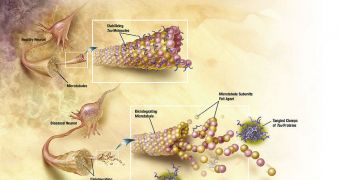University of California in Riverside (UCR) investigators say they may have discovered a new target for drugs in treating a neurodegenerative form of dementia called Alzheimer’s Disease. The molecule they discovered could also be targeted in the fight against other neurological disorders.
During the study, the team was also able to demonstrate a new connection between a protein called beta-arrestin and short-term memory. The pathways connecting the two could theoretically be used as a foundation for a new series of drugs or therapies aimed at Alzheimer's.
According to the team, this is the first time that this protein has been linked to learning, memory and the development of dementia. Thus far, experts have known that the tau and beta-amyloid proteins played roles in Alzheimer's, but not beta-arrestin.
One of the reasons why this molecule is linked to the neurological condition is because it is expressed throughout the human brain, including in a vitally-important area called the hippocampus. This region controls learning and memory to a great extent, PsychCentral reports.
The hippocampus is especially tied to the development and processing of short-term memories, before the data are coded for long-term storage, or are discarded. As a scaffolding protein, involved in underlying the physical connections between individual neurons, beta-arrestin is critical for this trait.
Recent investigations conducted on unsuspecting lab mice have revealed that low concentrations of beta-arrestin impair the rodents' learning abilities. This happens because new neural connections called synapses are constantly being formed between neurons, and they all need support.
“In some pathological conditions such as Alzheimer’s disease, loss of the old synaptic connections far exceeds the formation of new ones, resulting in overall loss of synapses and short-term memory loss,” UCR Associate Professor of Biomedical Sciences Iryna M. Ethell explains.
She is also the lead author of a new research paper describing the findings, which is published in the latest issue of the esteemed journal Proceedings of the National Academy of Sciences (PNAS).
“Our work, done on mice, shows that if beta-arrestin is removed from neurons, this loss of synapses is prevented. But we also know that beta-arrestin is required for normal learning and memory; so a fine balance needs to be established,” the team leader goes on to say.
“This balance could be easily achieved by pharmaceutical drugs in the future,” she concludes.

 14 DAY TRIAL //
14 DAY TRIAL //